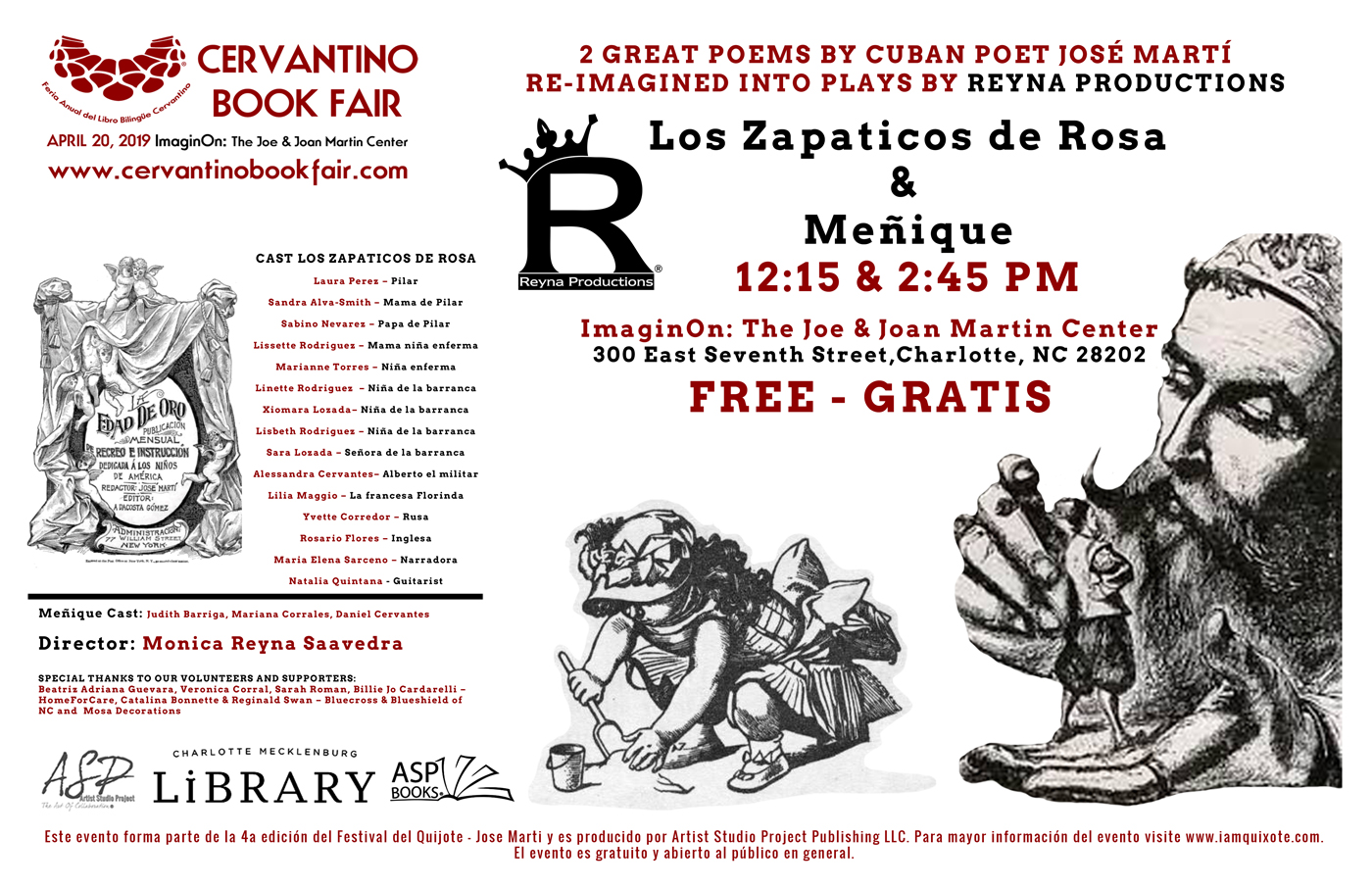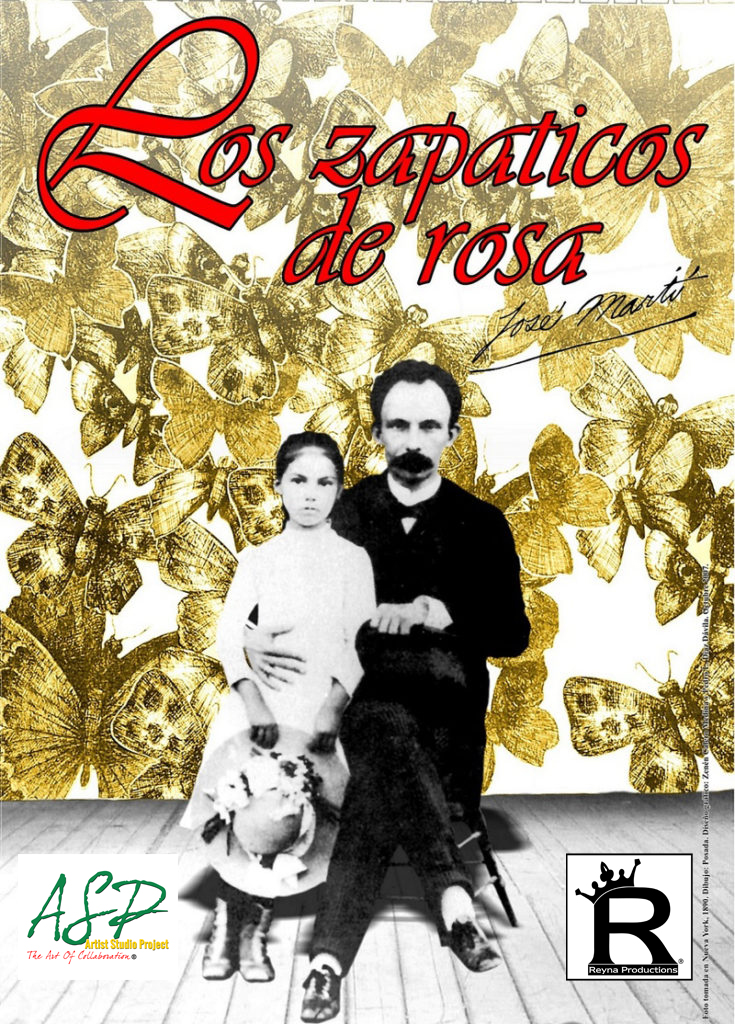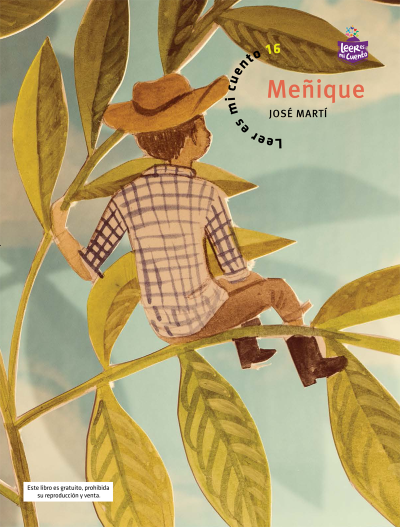2 GREAT POEMS BY CUBAN POET JOSÉ MARTÍ
RE-IMAGINED INTO PLAYS BY REYNA PRODUCTIONS
12:15 and 2:45 PM
 Artist Studio Project (ASP) and Reyna Productions will present ” LOS ZAPATICOS DE ROSA ” of Jose Marti’s poem and the tale “Meñique”. During the second annual Cervantino Book Fair April 20, 2019.
Artist Studio Project (ASP) and Reyna Productions will present ” LOS ZAPATICOS DE ROSA ” of Jose Marti’s poem and the tale “Meñique”. During the second annual Cervantino Book Fair April 20, 2019.
Artist Studio Project (ASP) y Reyna Productions realizarán “Los zapaticos de rosa” lectura dramatizada del poema de Jose Martí y el cuento “Meñique”. Durante la segunda Feria del Libro Cervantino el 20 de abril 2019.
Los Zapaticos de rosa (The Little Pink Shoes) is a poem by the Cuban writer José Martí. It was published for the first time in 1889, in the third issue of the monthly magazine La Edad de Oro.
In this poem Martí emphasizes the human feelings and universal values that should govern human behavior. In his verses the writer shows the roles that govern society.
This peculiar poem tells in verses how Pilar, a daughter of wealthy parents, goes out to the beach with her mother to show off her feather hat. During the journey Pilar took a jasmine, which means the sweetness of the woman, and the mother a carnation, which symbolizes joy and charm.
When arriving at the beach, the mother of Pilar warns her not to get wet the pink shoes, action that Pilar tries to fulfill so as not to upset her mother. Meanwhile, the girl in the pink shoes sees that on the side of the beach she is on, the sea is very sad and she sees that the fun is in the canyon, where the waves sound and the sand is whiter. Pilar runs to her mother and asks if she can go; she accepts but warns her not to wear the pink shoes. When the time passes the girl returns without her shoes; The mother asks him where he left them, but suddenly a lady interrupts Pilar’s mother. This tells the mother that she has a sick daughter and that when Pilar saw the girl without shoes, she gave him her own because she had more. At that moment the mother embraces Pilar for the good deed her daughter has done and she offers the lady her purse and Pilar’s blanket and ring. In the end, the mother and daughter arrive at home at night and the poem ends with a verse that characterizes it.
And says a butterfly
that saw from its rosebush,
saved under glass
the little pink shoes.
Director: Monica Reyna Saavedra
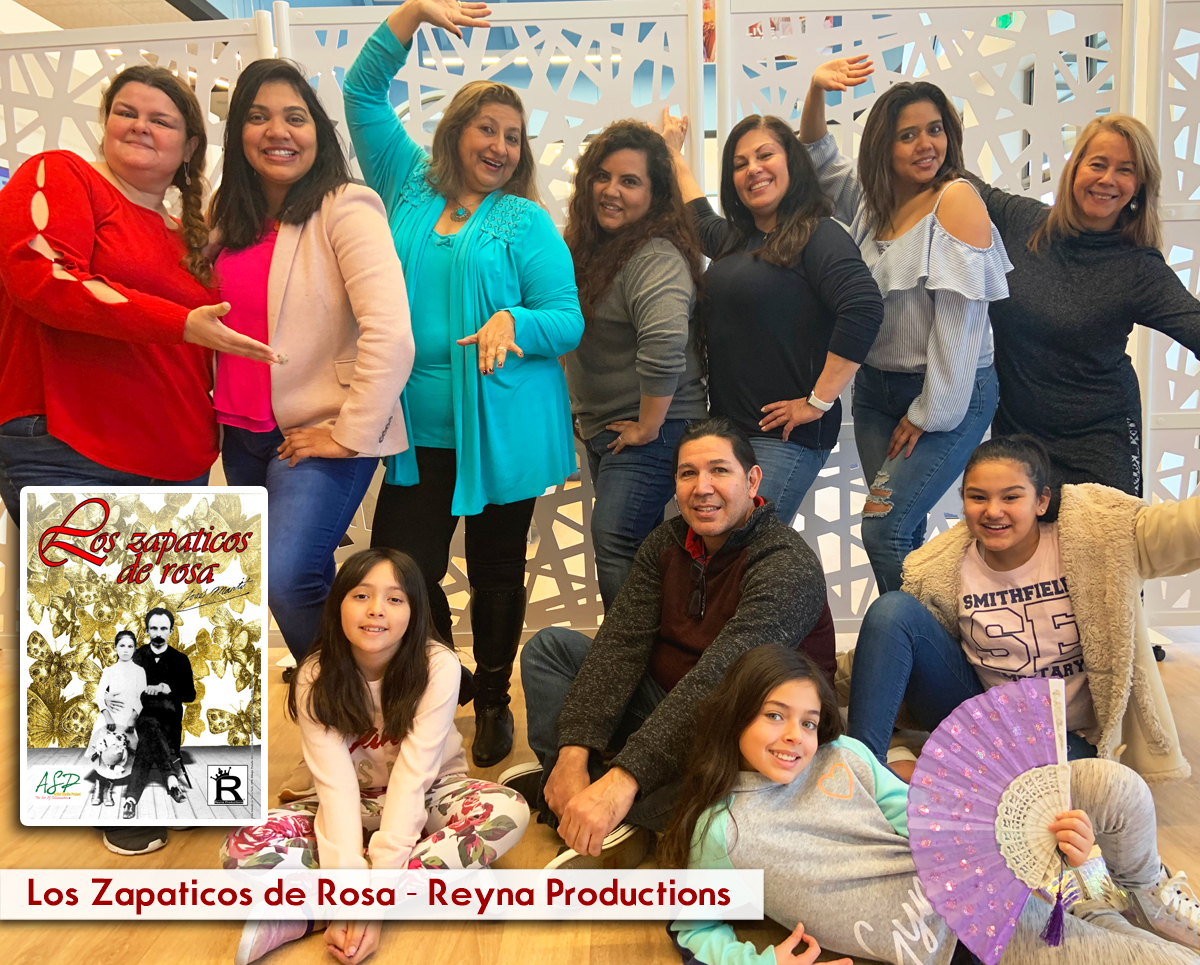 CAST LOS ZAPATICOS DE ROSA
CAST LOS ZAPATICOS DE ROSA
Laura Perez – Pilar
Sandra Alva-Smith – Mama de Pilar
Sabino Nevarez – Papa de Pilar
Lissette Rodriguez – Mama niña enferma
Marianne Torres – Niña enferma
Linette Rodriguez – Niña de la barranca
Xiomara Lozada– Niña de la barranca
Lisbeth Rodriguez – Niña de la barranca
Sara Lozada – Señora de la barranca
Alessandra Cervantes– Alberto el militar
Lilia Maggio – La francesa Florinda
Yvette Corredor – Rusa
Rosario Flores – Inglesa
Maria Elena Sarceno – Narradora
Natalia Quintana – Guitarist
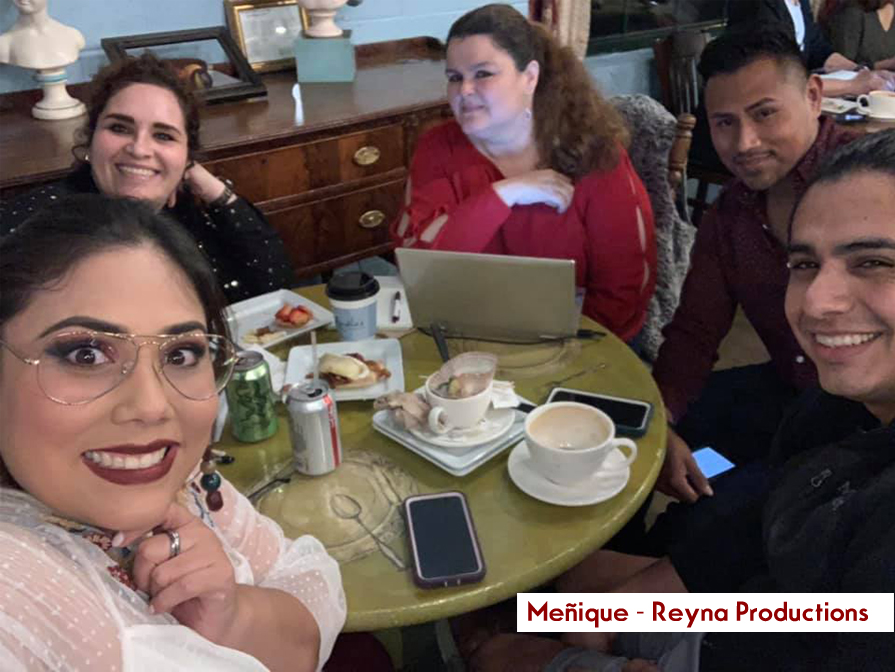
MEÑIQUE
(Little Finger)
It will be a re imagining of the story.
The production will be directed by Monica Reyna Saavedra, Artistic Director of Reyna Productions in collaboration with Artist Studio Project and will be part of the 4th Annual Festival of El Quixote.
Director: Monica Reyna Saavedra
Meñique Cast
Judith Barriga, Mariana Corrales, Daniel Cervantes
SPECIAL THANKS TO OUR VOLUNTEERS AND SUPPORTERS:
Beatriz Adriana Guevara, Veronica Corral, Sarah Roman, Billie Jo Cardarelli – HomeForCare, Catalina Bonnette & Reginald
Swan – Bluecross & Blueshield of NC, Mosa Decorations
Los Zapaticos de Rosa es un poema del escritor cubano José Martí. Fue publicado por primera vez en 1889, en el tercer número de la revista mensual La Edad de Oro.
En este poema Martí hace hincapié en los sentimientos humanos y en los valores universales que deben regir la conducta humana. En sus versos el escritor muestra los roles que rigen la sociedad.
Este peculiar poema cuenta en versos cómo Pilar, una niña hija de padres adinerados, sale a la playa con su madre para estrenar su sombrero de plumas. Durante el trayecto Pilar cogió un jazmín, que significa la dulzura femenina, y la madre un clavel, que simboliza la alegría y el encanto.
Al llegar a la playa, la madre de Pilar la advierte de que no se moje los zapaticos de rosa, acción que Pilar intenta cumplir para no enfadar a su madre. Mientras, la niña de los zapaticos de rosa se fija en que en el lado de la playa en el que está, el mar está muy triste y ve que la diversión está en la barranca, donde suenan las olas y la arena es más blanca. Pilar corre hacia su mamá y le pregunta si puede ir; esta acepta pero le advierte que no se moje los zapaticos de rosa. Al pasar el rato la niña vuelve sin sus zapatos; la madre le pregunta dónde los ha dejado, pero de repente una señora interrumpe a la madre de Pilar. Esta le cuenta a la madre que tiene una hija enferma y que al ver Pilar a la niña sin zapatos, le regaló los suyos ya que tenía más. En ese momento la madre abraza a Pilar por la buena acción que ha realizado su hija y esta le ofrece a la señora su bolso y la manta y el anillo de Pilar. Al final la madre y la hija llegan de noche a casa y el poema termina con un verso que lo caracteriza.
Y dice una mariposa
que vio desde su rosal
guardados en un cristal
los zapaticos de rosa.
MEÑIQUE
Será una re imaginación de la historia.
La producción estará dirigida por Monica Reyna Saavedra, Directora Artística de Reyna Productions en colaboración con Artist Studio Project y formará parte del 4º Festival Anual de El Quixote.
About the Director:
 Monica Reyna Saavedra was born and raised in Lima – Peru and has a passion for acting and storytelling. She started taking acting lessons at an early age and performed in theater and school plays through her teenage years starring in “The Diary of Anne Frank”, “Trees Die Standing Tall”, “Sargeant Canuto”, “The Doctor in Spite of Himself” and Six Characters in search of an Author”. In 1992 Monica moved to Charlotte, NC. After being away from acting for several years, she returned to stage with Theatre Charlotte in the 2009 staged reading of “The House of Bernarda Alba.” In 2010 she was a guest participant with a piece of her own, “Personal Treasure”, at Storytelling Night – Noche de Cuentos hosted by Charlotte Mecklenburg Library, and in 2011 she had a guest appearance at ArtFusion a Mint Museum event with her original piece “El Dorado”. In 2013 “El Regalo de San Valentin” with Queens University’s Center of Latinos Studies and the bilingual play “Mama Goose” with the Theatre Department at UNC Charlotte were a display of her versatility as an actress with her performances for adult and children audiences, and earned her a recognition for her contribution to Latin American arts and culture by ArtSi, and was invited as a featured artist at “Con A de Arte” where she performed a fragment of an adaption of “Antigone”. In 2016 she portrayed one of the female characters in “The Vagina Monologues”, and in 2017 she ventured on a new facet directing a second season of “The Vagina Monologues”. In early 2018 she directed “The Tenth Muse” part of El Festival del Quixote with Artist Studio Project. In late 2018 she started Reyna Productions, a community theater group that brings opportunities to amateur actors of all ages, and directed “Despacito a Belen” in collaboration with Tlahtolcalli and The Levine Museum of the New South. Other appearances include her participation as background artist for TV film “Westbrook High” produced by the UPtv network, as well as guest appearances at community artistic and cultural events. Currently she works at Duke Energy, and has been performing locally at family events since 2011 under the name Rocotita Show.
Monica Reyna Saavedra was born and raised in Lima – Peru and has a passion for acting and storytelling. She started taking acting lessons at an early age and performed in theater and school plays through her teenage years starring in “The Diary of Anne Frank”, “Trees Die Standing Tall”, “Sargeant Canuto”, “The Doctor in Spite of Himself” and Six Characters in search of an Author”. In 1992 Monica moved to Charlotte, NC. After being away from acting for several years, she returned to stage with Theatre Charlotte in the 2009 staged reading of “The House of Bernarda Alba.” In 2010 she was a guest participant with a piece of her own, “Personal Treasure”, at Storytelling Night – Noche de Cuentos hosted by Charlotte Mecklenburg Library, and in 2011 she had a guest appearance at ArtFusion a Mint Museum event with her original piece “El Dorado”. In 2013 “El Regalo de San Valentin” with Queens University’s Center of Latinos Studies and the bilingual play “Mama Goose” with the Theatre Department at UNC Charlotte were a display of her versatility as an actress with her performances for adult and children audiences, and earned her a recognition for her contribution to Latin American arts and culture by ArtSi, and was invited as a featured artist at “Con A de Arte” where she performed a fragment of an adaption of “Antigone”. In 2016 she portrayed one of the female characters in “The Vagina Monologues”, and in 2017 she ventured on a new facet directing a second season of “The Vagina Monologues”. In early 2018 she directed “The Tenth Muse” part of El Festival del Quixote with Artist Studio Project. In late 2018 she started Reyna Productions, a community theater group that brings opportunities to amateur actors of all ages, and directed “Despacito a Belen” in collaboration with Tlahtolcalli and The Levine Museum of the New South. Other appearances include her participation as background artist for TV film “Westbrook High” produced by the UPtv network, as well as guest appearances at community artistic and cultural events. Currently she works at Duke Energy, and has been performing locally at family events since 2011 under the name Rocotita Show.
Monica Reyna Saavedra nacio y crecio en Lima – Peru y su pasion son la actuacion y contar historias. Empezo a tomar clases de actuacion a temprana edad y actuo en teatro y programas escolares en su adolescencia, protagonizando “El Diario de Ana Frank”, “Los Arboles Mueren de PIe”, “El Sargento Canuto” “El Medico a Palos” y “Seis Personajes en Busca de un Autor”. En 1992 Monica se mudo a Charlotte, NC. Despues de estar varios anos alejada de la actuacion, regreso a los escenarios con Theatre Charlotte en el 2009 con la lectura dramatizada de “La Casa de Bernarda Alba”. En el 2010 fue invitada a participar con una pieza de su autoria “Tesoro Personal” a Noche de Cuentos a cargo de la Biblioteca de Charlotte Mecklenburg, y en el 2011 tuvo una participacion en el evento ArtFusion del Museo Mint con su pieza original “El Dorado”. En el 2013 “El Regalo de San Valentin” con El Centro de Estudios Latinos de la Universidad Queens y la obra bilingue “Mama Goose” UNC Charlotte fueron una muestra de su versatilidad como actriz con sus actuaciones dirigidas a publico adulto y de ninos, que le hizo acreedora a un reconocimento por su contribucion a las artes y cultura Latino Americana por parte de ArtSi, y fue invitada como artista destacada a “Con A de Arte” donde interpreto un fragmento de una adaptacion de “Antigona”. En el 2016 interpreto uno de los personajes de “Los Monologos de la Vagina”, y en el 2017 se aventuro a una nueva faceta dirigiendo una segunda temporada de “Los Monologos de la Vagina”. A principios del 2018 dirigio “La Decima Musa” para el Festival del Quixote con Artist Studio Project. A finales del 2018 empezo Reyna Productions, un grupo de teatro comunitario de actores aficionados de todas las edades y dirigio “Despacito a Belen” en colaboracion con Tlahtolcalli y el Museo Levine del Nuevo Sur.. Otras apariciones incluyen su participacion en la pelicula para la television “Westbrook High” producida por UPtv network, tambien como otros eventos artistico culturales de la comunidad.. Actualmente trabaja en Duke Energy, y viene actuando en eventos locales de tipo familiar desde el 2011 bajo el nombre Rocotita Show.

